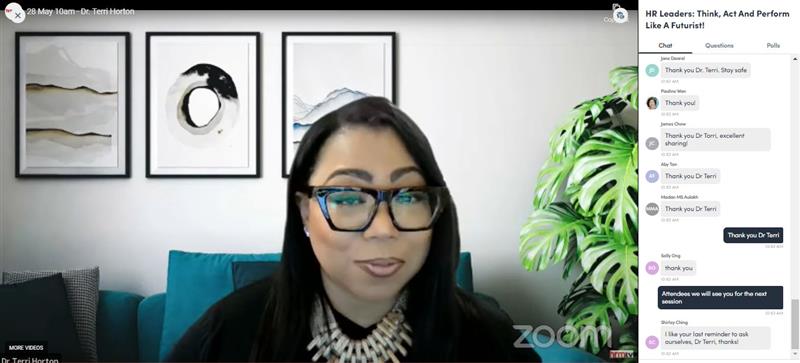Decoding the priorities that will shape the future of work
- Shawn Liew
- Topics: Asia-Pacific, DE&I, Digital Transformation, Employee Experience, Employment Law, Flexible Work, Health and Wellness, Home Page - Featured, Home Page - News, HR Technology, Leadership, Learning and Development, Mobility, News, Professional Development, Recruitment, Restructuring, Talent Management

Over two days of insightful presentations and discussions, HR Tech Fest Connect 2021 decoded many of the key priorities facing HR leaders as they plan to lead their organisations into the future of work.
Or, as Dr Terri Horton, Workforce Futurist and Founder of FuturePath suggested, it is imperative that HR leaders begin to think, act and perform like futurists.
In her keynote address on Day 2, Dr Horton explained that this begins by HR leaders constantly scanning social, technological, economic, environment, political, global and competitive shifts in consumer behaviour, values and preferences. HR needs to be data-driven and be able to look for signals and understand their significance, and what it means for the future of your business, she added.
Dr Horton also emphasised the importance of hyper-relevancy, where HR leaders need to prioritise, acquire, demonstrate and leverage skills and competencies such as future of work strategies, AI fluency, analytics, digital transformation, corporate business strategy, cross-functional expertise, risk management, humanising the worker experience, as well as growth and innovation cycles.
Citing the lack of professional development as the top reason for employee turnover, Eklavya Bhave, Regional Director, APAC and Japan, Coursera, asked HR leaders to identify the top skills that will be required to build their organisations in 2021 and beyond.
Based on research conducted by Coursera, the essential skills of the future identified post-pandemic were predominately non-technical skills, as compared to pre-pandemic, when organisations felt that technical skills took priority.
By 2025, expect problem-solving skills to be added to the mix of digital and human skills, predicted Bhave, who highlighting the importance of building critical skills for critical roles with the organisation.
The pandemic has not only changed the way we work, but has also increased the importance of agility, said Suchita Prasad, Leadership Development, Talent and Change Management Expert, McKinsey & Company.
Organisations today are required to be more agile and flexible in order to attract and retain talent, partly because work teams will become smaller, faster and more collaborative. To adapt, employers need to embrace independent workers so that increased labour productivity can be gained from better matching of talent, Prasad added.
Digital nomads are likely to ask themselves this question: If I can access information from anywhere, why can’t I work from anywhere?
The emergence of this group of individuals, coupled with the onset of the pandemic, has seen an increasingly number of people relocating to remote or hybrid work hubs, said Charles Ferguson, General Manager, APAC, Globalization Partners.
When an organisation’s talent pool is based around the globe, organisations need to consider the long-term vision of what they want to do with their business in a remote work setting, and understand that employees have the empowerment of choice, he added.
In managing a hybrid workforce, there are a number of legal issues for organisations to consider. For instance, can employers demand that they are vaccinated, and can employees demand that employers provide vaccination?
This depends on the nature of the job, answered Kala Anandarajah, Head, Competition & Antitrust and Trade, Rajah & Tann Singapore. Are employees working at the front line, and do they meet a lot of people during the course of their work, she elaborated.
As the world of work evolves, businesses and roles need to as well, suggested Michael Lee, Managing Consultant, South-East Asia, SHL. In terms of leadership, organsiations are over three times more likely to make the right leadership mobility decisions with the power of context. Lee also advised organisations to view leadership through three lenses:
Competency: Strength of natural fit to leadership competencies
Context: Strength of natural fit to context, or business challenges the organisation operates in
Experience and Performance: Strength of critical leadership experiences.
READ: Key predictions that will define the future of work
To harness the benefits presented by diversity and inclusion, a localised approach towards identifying systemic inequality and building relevant locations is a must in Asia-Pacific, said Sophie Guerin, Head of Diversity & Inclusion, APAC at John & Johnson.
Firstly, ensure accountability. Driving greater corporate accountability in ways that are relevant for Asia-Pacific allows companies to make a more nuanced and targeted approach towards developing initiatives and strategies that can address inequality, she explained.
Next, ensure that HR systems are in place to allow the tracking of data to protect the privacy of employees before adopting a thorough and holistic approach to data, so as to develop meaningful D&I strategies, solutions and outcomes to meet business challenges and opportunities, Guerin concluded.
With Sentosa being one of the most iconic landmarks in Singapore, Fabian Lim, Senior Assistant Director, Sales, Business & Channels Development, Sentosa Development Corporation, shared how organisations can take advantage of the facilities offered by Sentosa to keep employee moral high during times of crisis, strengthen interpersonal connections amid remote working arrangements, and improve productivity among employees.
Presenting her vision of employee wellbeing in the workplace, Sulaxmi Prasad, HR Director APAC, Herbalife Nutrition highlighted that organisations need to care more deeply about employee wellbeing because it can help improve productivity and engagement, drive better results and create a more resilient workplace culture.
Noting how employee wellbeing can be represented through various forms, including financial wellbeing, emotional wellbeing and intellectual wellbeing, she urged organisations to design for diversity and inclusion, and include all employees with no exception.






